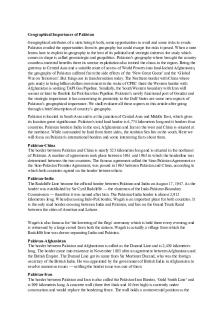Evolution of Geographical Thought PDF

| Title | Evolution of Geographical Thought |
|---|---|
| Author | Elise Jones |
| Course | Geographical Perspectives |
| Institution | University of East Anglia |
| Pages | 4 |
| File Size | 304.4 KB |
| File Type | |
| Total Downloads | 61 |
| Total Views | 143 |
Summary
how academic geography has developed from the mid 20th century. Lecturer: Andrew Lovett...
Description
Geographical perspectives – module-4010Y Evolution of Geographical Thought Paradigms allowed geographical thought to evolve. A paradigm represents a set of values, assumptions, methods and exemplars shared by an academic community which shape the way they undertake investigations. New paradigms arise when existing world views no longer seem capable of solving problems that the discipline wishes to address. This is internalist perspective. A contextualist interpretation would argue that academic disciplines do not exist in a vacuum i.e. to understand the history of Geography it is also necessary to understand the history of the societies of which Geography is part. All empirical research practices are shaped by a wider philosophical framing that includes dimensions of: o Ontology: the study of the nature of being and existence – ask the question “what can we know about the world?” o Epistemology: the theory of knowledge – hoe we can know what we know? o Methodology: how can we measure it?
The Age of Exploration European knowledge (and conquest) of the surrounding world expanded enormously by the 17th century.
Skills in navigation and map making were an important underpinning of this economic and political power. Establishment of the Discipline The 19th century saw the founding of geographical societies in many countries (e.g. UK in 1830). These were very influential in subsequent colonial exploration and expansion. This was accompanied by the creation of university professorship. In the imperial era of the late 29th century there was particular interest in geopolitics.
The Geographical spot of History
Mackinder (1904) argued that control of the Eurasian landmass would enable domination of the rest of the world. The main threat to the power of the UK was therefore from an alliance between Germany and Russia.
Geographical Theories Geographical studies began to move beyond an emphasis on inventory to developing more general theoretical ideas.
Environmental Determinism The belief that the natural environment causes and explains the human/cultural world. “Man is the product of the earth’s surface” – Influences of Geographical Environment (1911) “…the northern peoples of Europe are energetic, provident, serious, thoughtful rather than emotional, cautious rather than impulsive. The southerners of the subtropical Mediterranean basin are easy-going, improvident except under pressing necessity, gay, emotional, imaginative, all qualities which among negroes of the equatorial belt degenerate into grave racial faults” – Influences of Geographical Environment (1911) This prejudice and racism are completely unacceptable today. Ellesworth Huntingdon (1876-1947) related the rise of civilisation in the mid-lattitudes and the lack of development in the tropics to climate conditions. – Why were such ideas popular at the time?
Reactions to Environmental Determinism Anarchist perspective emphasising mutual aid and small-scale communal living rather than nationalism. The French school of possibilism presented humans as an active rather than a passive element – perceiving the range of uses to which an environment could be put and choosing that which bet fitted cultural dispositions.
Regional Geography the regional paradigm that develops post 1918 was another response to previous theoretical and nationalist perspectives. The approach emphasised synthesis (of relevant physical and human characteristics) and the uniqueness of places. “Geography is concerned to provide accurate, orderly and rational description and interpretation of the variable character if the earth’s surface” “…it seeks to acquire a complete knowledge of the areal differentiation of the world”
- The Nature of Geography (1939) “That geography is a field of knowledge which is concerned to know and understand individual cases follows directly from its function as the study of places. Th concept of place, like that pf person or event, is in its essence a concept of the specific” – Perspective on the Nature of Geography (1959)
Current example of Regional Geography Natural England have defined 159 National Character Areas, each based on a ‘unique combination of landscape, biodiversity, geodiversity, history and cultural and economic activity....
Similar Free PDFs

Geographical context
- 2 Pages

German School OF Thought
- 7 Pages

Schools of thought
- 44 Pages

Ethical Schools OF Thought
- 6 Pages

History of Social Thought
- 3 Pages

Ddd - School of thought
- 2 Pages

Realist School of Thought
- 11 Pages
Popular Institutions
- Tinajero National High School - Annex
- Politeknik Caltex Riau
- Yokohama City University
- SGT University
- University of Al-Qadisiyah
- Divine Word College of Vigan
- Techniek College Rotterdam
- Universidade de Santiago
- Universiti Teknologi MARA Cawangan Johor Kampus Pasir Gudang
- Poltekkes Kemenkes Yogyakarta
- Baguio City National High School
- Colegio san marcos
- preparatoria uno
- Centro de Bachillerato Tecnológico Industrial y de Servicios No. 107
- Dalian Maritime University
- Quang Trung Secondary School
- Colegio Tecnológico en Informática
- Corporación Regional de Educación Superior
- Grupo CEDVA
- Dar Al Uloom University
- Centro de Estudios Preuniversitarios de la Universidad Nacional de Ingeniería
- 上智大学
- Aakash International School, Nuna Majara
- San Felipe Neri Catholic School
- Kang Chiao International School - New Taipei City
- Misamis Occidental National High School
- Institución Educativa Escuela Normal Juan Ladrilleros
- Kolehiyo ng Pantukan
- Batanes State College
- Instituto Continental
- Sekolah Menengah Kejuruan Kesehatan Kaltara (Tarakan)
- Colegio de La Inmaculada Concepcion - Cebu








